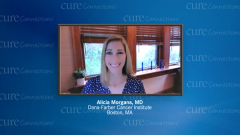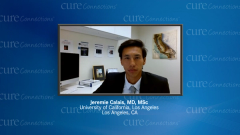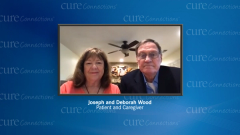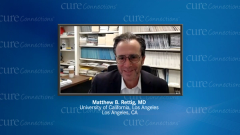
Treatment Journey Shared by a Patient with mCRPC and his Caregiver
Joseph Wood details his treatment journey with metastatic castration-resistant prostate cancer (mCRPC) and how the journey has impacted his wife and caregiver, Deborah Wood.
Episodes in this series

Alicia Morgans, MD:There are many ongoing trials looking at lutetium PSMA [prostate-specific membrane antigen] agents.I’m curious to talk to Joe about how your doctor talked to you about options. One of those options, of course, included a clinical trial. How did that conversation proceed, and what did you think about as you were trying to make those choices and choose a treatment for yourself?
Joseph Wood: As Dr Rettig knows, I’m not opposed to chemotherapy, but I’d like to put it off to the last treatment available. When he mentioned the SPLASH [ph] trial, I was quite excited because it doesn’t require chemotherapy, as the FDA will when they release the lutetium to the general public. I was quite excited to hear about the trial and to get involved in it.
Alicia Morgans, MD: What did you have to do to get ready for the clinical trial? And can you describe to us a bit about what the trial is testing?
Joseph Wood: As you know, we’re a long distance away. We spend half of our lives in Mexico and half in central California, so timing is the biggest issue that we have. Of course, we have to find a place to stay in LA [Los Angeles] for the treatments. Deborah handles all of that very well, the ins and outs of staying at different hotels, when we can leave and when we can’t. The scans have really shown me where the cancer is, so I’m anxious to see them. The last time I had a PSMA scan, it was quite exciting to see the inside of my body and where the cancer is so you can understand how affected you are. When you’re just the patient and have cancer but no visual, you don’t have a clear idea of where the cancer is or what it’s doing.
Alicia Morgans, MD: I think to that point, it’s kind of easy to see when you have this color-coded picture, at least for me, and I look at a fair number of scans. It’s nice to have a bull’s-eye to understand this is what we’re talking about. I think it can be useful. When you’ve been thinking about this type of approach to treatment, PSMA PET [positron emission tomography] scans, what did you learn about? What had you thought about related to radioligand therapies?
Joseph Wood: Actually, I listened to a urology podcast. Neil Love, [MD] does the podcast, and sometimes they talk over my head because it’s all doctors and oncologists and urologists. But I glean a great bit of knowledge from that podcast and would recommend it to any patient with prostate cancer.
Alicia Morgans, MD: That’s great. I think those kinds of resources are so important. It’s nice to know when you have something trustworthy to engage with, so thank you for sharing that. Debbie, I’d love to hear from your perspective what it was like thinking about this clinical trial. Were you involved in the decision-making around engaging in this clinical trial? What was your experience?
Deborah Wood: Yes, we stay pretty involved with everything together. I was leery because of my ignorance about radiation and how it reacts in the body. And as we started getting into it and understanding that this could be something that is a life extension, that we’ll still have him somewhat normal as far as his activities, I was really happy that he decided to go with this. I believe he was at a point in his treatments where he was going to have to decide on what he was going to go into, and this trial helped him make that decision. It will hopefully help other people with their cancer.
Alicia Morgans, MD: I hope so too. I wonder other than that concern about the radiation, did you have other concerns about him getting this treatment or participating in the trial?
Deborah Wood: I was kind of very selfish in my thoughts because there’s not a lot of information that the caregiver gets in advance to prepare. For example, do we need a hospital bed now? Or does he need certain medicines to help him eat his food now? I think a little more information to the caregivers would be a lot of help. It would be helpful to me because I am almost two hours from an actual grocery store or Costco, so it’s not like I can run down the street and grab something that I need.I think a little more information given to the caregivers would help both the patient as well as the caregivers.
Alicia Morgans, MD: Thank you for that.
Transcript edited for clarity.








